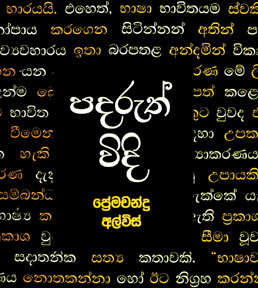Language’s ‘rights’ and ‘wrongs’
 ‘Rhetoric’ is a common term used over the years to denote the power
of persuasive and impressive speaking and writing. This also signifies
the elimination of common errors enabling a better communication. There
is an ongoing discussion on the standard of the knowledge of language
and grammar both at the school level of education and at professional
levels gained via higher education. ‘Rhetoric’ is a common term used over the years to denote the power
of persuasive and impressive speaking and writing. This also signifies
the elimination of common errors enabling a better communication. There
is an ongoing discussion on the standard of the knowledge of language
and grammar both at the school level of education and at professional
levels gained via higher education.
The controversies abound around the words, sentences, sentence
patterns, expressions and other emerging semantic factors. Mass media
channels, with special reference to FM channels are accused of misguided
and pseudo usages on the part of announcers and programme moderators.
Invaluable writing
This ongoing situation is addressed by several scholars belonging to
university and non-university levels. In this direction one scholar who
was engaged in such a venture is a veteran translator and columnist
Premachandra Alwis.
He continued to contribute an invaluable column to a weekly Sinhala
literary supplement titled as ‘Padarut Vidi’. His contribution was
noteworthy as he dealt on common errors as well as wrong usage as a
result of the correct awareness of various forms of a better form of the
use of language.
 While refraining from blaming any particular person or academic,
Premachandra Alwis goes n to call material from various available
sources for his investigation in the manner of a teacher and researcher. While refraining from blaming any particular person or academic,
Premachandra Alwis goes n to call material from various available
sources for his investigation in the manner of a teacher and researcher.
He picks sentences from several newspapers and shows how the embedded
expressive intentional meaning is clouded by pseudo constructions and
misguided connection patterns. Perhaps he sees that given the chance of
learning via rectification the knowledge in a better expression could be
achieved.
In the text he has published by collecting some of his notes written
to the said supplement, the title is apt as he denotes in the form of
notes what should be expressed as against what should be avoided. The
term ‘Padarut Vidi’ may mean a cluster of meanings. It may also mean
‘meanings in words’ as ‘vidi’ may mean ‘modes’. As such the book is a
basic guide to all those interested in language and its usage in a
multifaceted manner. As an initial guidance, Alwis rests focus on
traditional belief.
Traditional forms
This view is supplemented from Sidat Sangarava’ where he quotes
‘vaharanu seren sapaya’ (held through traditional forms) as the basic
premise. According to Alwis, people have been using a spoken language
and a written language. The spoken language perhaps had been much more
powerful than the written language. In this case, what is accepted as
spoken language comes to stay as against the learned usages in the
written language. He attempts to explain in the clearest possible manner
how words are formed and used.
When he examines how the pattern of use had been changed either via
ignorance or undermining of a visionary standpoint. Then he presents
several instances where new words and verbal patterns have entered the
communication field. One example is the Sinhala equivalent to the word
‘launch’. The term is coined in Sinhala as ‘Pot Dorata Vadinava’. But
the word ‘diyat kirima’ had been in vogue over the years in the agrarian
culture. But ‘diyat kirima’ may not sound good. Instead of all these, a
new term has come to stay. That is denoted as ‘janagatha kireema’.
I am not sure if the term may give the exact intended meaning of
‘launch’. In the common public parlance, ‘janasathu’ means
‘nationalized’ as brought down the years giving way to a political
sense. The writer does not take sides in this matter. He only states
that a term is available as ‘diyat kirima’. Alwis also picks yet anther
term ‘turning point’ where he says that two words are coined: ‘heravum
for ‘turning’ and ‘lakshaya’ for ‘point’ resulting in a strange pattern:
‘heravum lakshya’.
Classical knowledge
As new words and verbal patterns enter the expression, one has to
reconsider whether they denote any real sense or not. One cardinal point
that Alwis draws is that the lack of knowledge in classical literature
is the result of these accidental coinages, which may sound fallacious
and unintelligent.
He also examines the Sinhala expression ‘apada kalamanakaranaya’ used
to denote ‘crisis management’. He feels that the Sinhala word coinage is
too narrow and does not express a wider sense. He draws our attention to
some pitfalls and fallacies as found the textbooks prescribed at school
levels.
This, he firmly believes, will give rise to a false sense of language
and grammar acquisition, which may inevitably come to stay as ‘right’ as
against the ‘wrong’. Alwis examines the standpoint of the advent of
technologies on words, sentences and other verbal patterns such as
computer and mobile phones.
All in all, this volume of notes could be recommended as a handbook.
He attempts to cover words, similar sounds and spellings, words
frequently confused, informal word patterns, archaic and obsolete words,
technical words, mixed and illogical constructions, shifts in tense,
mood and verb forms.
[email protected]
|







